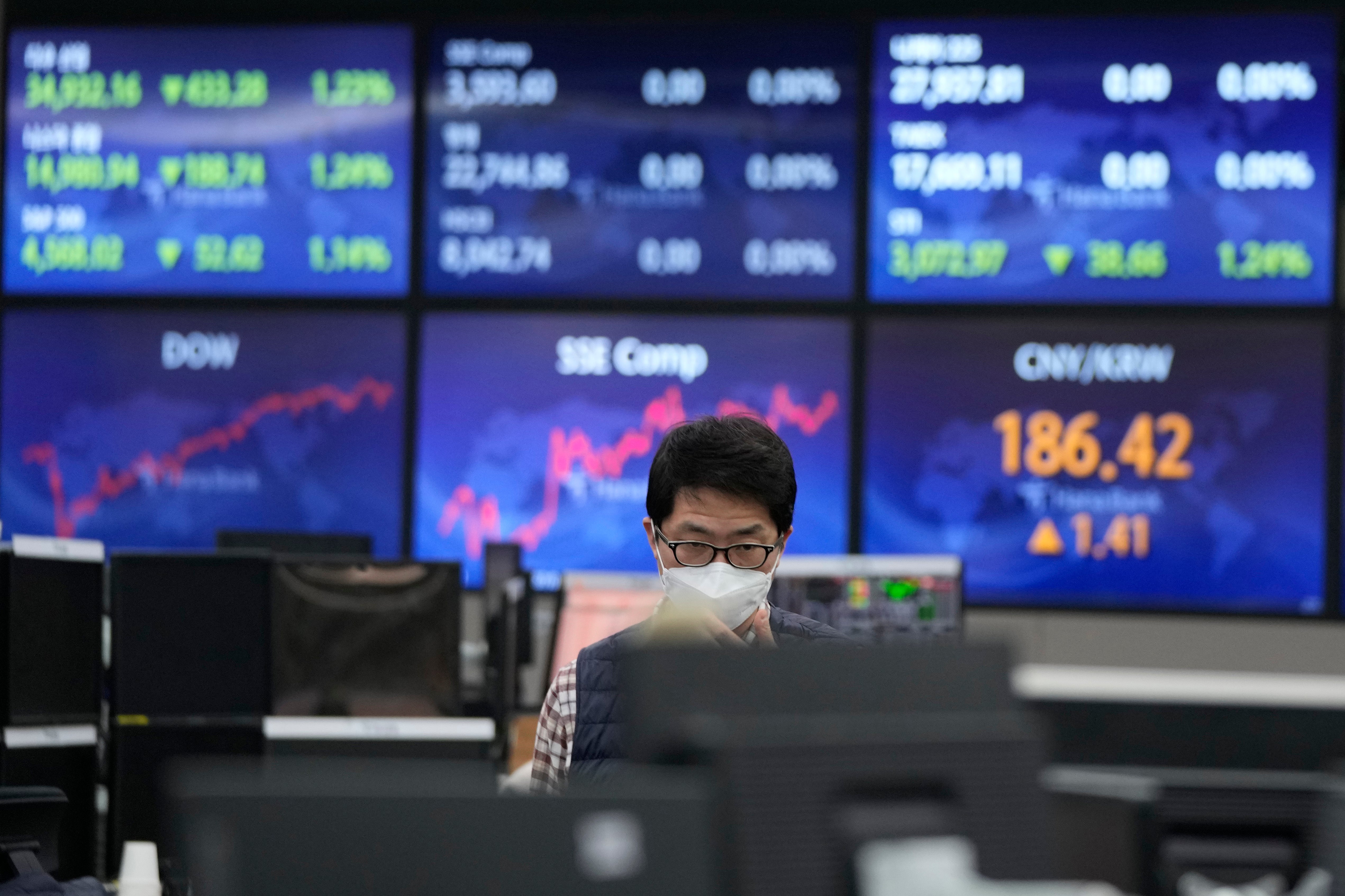Asian markets bounce back from omicron sell-offs
Asian shares have bounced back from a worldwide slump in financial markets spurred by worries about how badly the omicron variant, inflation and other forces will hit the world economy

Your support helps us to tell the story
From reproductive rights to climate change to Big Tech, The Independent is on the ground when the story is developing. Whether it's investigating the financials of Elon Musk's pro-Trump PAC or producing our latest documentary, 'The A Word', which shines a light on the American women fighting for reproductive rights, we know how important it is to parse out the facts from the messaging.
At such a critical moment in US history, we need reporters on the ground. Your donation allows us to keep sending journalists to speak to both sides of the story.
The Independent is trusted by Americans across the entire political spectrum. And unlike many other quality news outlets, we choose not to lock Americans out of our reporting and analysis with paywalls. We believe quality journalism should be available to everyone, paid for by those who can afford it.
Your support makes all the difference.Asian shares bounced back Tuesday from a worldwide slump in financial markets spurred by worries about how badly the omicron variant, inflation and other forces will hit the world economy.
Tokyo gained more than 2% and other benchmarks in Asia also were higher.
Much of the concern over the global outlook has been driven by the omicron variant of coronavirus. Cases have skyrocketed in Europe and in the U.S., where federal health officials announced it accounted for 73% of new infections last week, a nearly six-fold increase in only seven days.
In Asia, cases of coronavirus have surged in Australia and South Korea, as governments tighten precautions to prevent or curb outbreaks. But bargain-seeking traders have often opted to buy when prices fall, adding to the volatility that is common during the thin activity of the holiday season.
Tokyo's Nikkei 225 index rose 2.1% to 28,517.59 and the Hang Seng in Hong Kong added 1.2% to 23,024.78. In Seoul, the Kospi gained 0.4% to 2,975.03, while the Shanghai Composite index picked up 0.9% to 3,626.48. In Sydney, the S&P/ASX 200 climbed 0.9% to 7,355.00.
Monday's sharp declines were “enough to sucker the fast-money FOMO gnomes in Asia into action," Jeffrey Halley of Oanda said in a commentary.
Shares fell around the world on Monday. Stocks of oil producers helped lead the way lower after the price of U.S. crude fell 3.7% on concerns the newest coronanvirus variant could lead factories, airplanes and drivers to burn less fuel.
Oil prices also rebounded Tuesday, with the U.S. benchmark gaining 85 cents to $69.46 per barrel in electronic trading on the New York Mercantile Exchange. Brent crude, the international standard for pricing, rose 64 cents to $72.16 per barrel.
Omicron may be the scariest force hitting markets, but it’s not the only one. A proposed $2 trillion spending program by the U.S. government took a potential death blow over the weekend when an influential senator said he could not support it. Markets are also still absorbing last week's momentous move by the Federal Reserve to more quickly remove the aid it's throwing at the economy, because of rising inflation.
They all combined to drag the benchmark S&P 500 1.1% lower to 4,568.02. The Dow Jones Industrial Average fell 1.2%, to 34,932.16. The Nasdaq composite fell 1.2%, to 14,980.94.
Smaller company stocks fared worse than the rest of the market. The Russell 2000 index fell 1.6%, to 2,139.87.
Thailand is mulling tighter precautions after just recently loosening stringent quarantine rules to help its tourism sector recover. The Dutch government began a tough nationwide lockdown on Sunday, while a U.K. official on Monday said he could not guarantee new restrictions would not be announced this week. The Natural History Museum, one of London’s leading attractions, said Monday it was closing for a week because of “front-of-house staff shortages.”
In the U.S., President Joe Biden is expected to announce new steps he is taking, “while also issuing a stark warning of what the winter will look like for Americans that choose to remain unvaccinated,” the White House press secretary said over the weekend.
Another feared outcome of the omicron variant is that it could push inflation even higher and if it leads to closures at ports, factories and other key points of the long global supply chains leading to customers could worsen already ensnarled operations.
Such troubles helped drive prices at the consumer level in November up 6.8% from a year earlier, the fastest inflation in nearly four decades.
But some economists argue omicron could have the opposite effect: If the variant leads to lockdowns or scares consumers into staying home, economic activity could slow, and with it, the surging demand that has overwhelmed supply chains and driven up consumer prices
The worst-case scenario would see the economy decelerate without providing relief from already built-in inflation.
In currency trading, the U.S. dollar rose to 113.73 Japanese yen from 113.61 yen. The euro fell to $1.1276 from $1.1283.